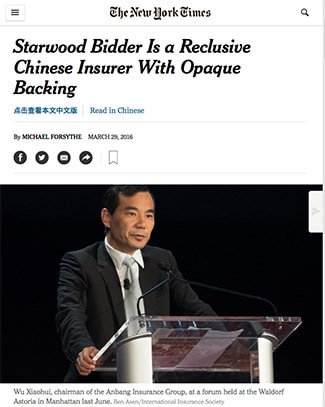
Anbang’s salespeople have had a record year pushing high yield products
China’s Anbang Insurance lost the $13.6 billion battle for Starwood Hotels and Resorts in April, but the prolonged campaign to acquire the global hotel group may have helped drive a sales surge that has transformed the 12-year-old privately held group into the mainland’s largest seller of insurance.
Thanks to a surge in sales of high-yield wealth management products Anbang is now China’s biggest insurance company in terms of premiums collected, jumping to first place in the industry this year from 40th position in 2012, according to an account in the Financial Times citing official data.
Anbang, which has won fame in China through its acquisition of trophy assets such as its $1.95 billion deal for New York’s Waldorf Astoria Hotel in 2014, may have been able to supercharge its sales by leveraging its increasingly public profile to sell aggressively structured financial products to retail investors looking for alternatives to China’s negligible bank interest.
16X Jump in Sales in One Year

In China, Anbang’s surge of publicity coincided with a jump in sales
One of the biggest visible changes for Anbang after its front-page pursuit of Starwood, which followed a string of earlier high profile acquisitions, has been a 16-times increase in its sales of investment-related insurance policies this year.
The company, which grew out of a car rental service in Zhejiang from when it was founded in 2004 to become one of China’s biggest financial concerns, sold $28.4 billion in insurance-based wealth management products during the period from January through May, up from just $1.7 billion one year ago, according to figures from the China Insurance Regulatory Commission.
China’s insurance companies have been able to build revenues quickly by selling short term financial products combined with life insurance that pay yields of five percent or more. Guangdong-based Baoneng Group has used income from sales of its “universal insurance” products, which merge death protection with short-term investment benefits, to fund its attempted takeover of China Vanke.
Squeezed between rapidly rising costs and bank deposits that pay less than 0.5 percent interest rates, Chinese retail investors have turned to wealth management products in increasing numbers in recent years.
Big Sales and Even Bigger Obligations
Anbang ultimately abandoned its own $14 billion bid for Starwood in April with the only explanation being that “due to various market considerations, the Consortium has determined not to proceed further.” However, the publicity from that four-month long battle may have opened the door to its higher level of sales this year.
Now the pressure from delivering on its high yield promises to investors can be expected to continue to put pressure on an investment group long on ambition, but short on experience.
Wu, who gained access to top level connections as well as a network of wealthy friends when he married Deng Xiaoping’s grand-daughter is said to covet the title of China’s “number one businessman” and to be seeking central place on the world stage for Anbang.
To derive high yield returns in a New York market where commercial real estate assets rarely trade at returns of four percent or more Anbang announced last month that it will convert most of the Waldorf Astoria into condos, betting that a Manhattan market currently awash in high-end luxury homes would turn around before its homes hit the market.
With Anbang having already acquired more than $12 billion in overseas assets in the last two years the mainland insurer is likely to be looking for more creative ways to squeeze yield from its portfolio if it hopes to satisfy the expectations of its growing mainland customer base.
[…] China’s Anbang Insurance lost the $13.6 billion battle for Starwood Hotels and Resorts in April, but the prolonged campaign to acquire the global hotel group may have helped drive a sales surge that has transformed the 12-year-old privately-held group into the mainland’s largest seller of insurance. Read more on: http://www.mingtiandi.com […]